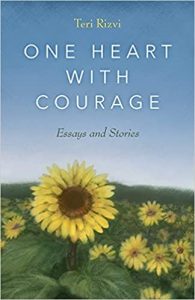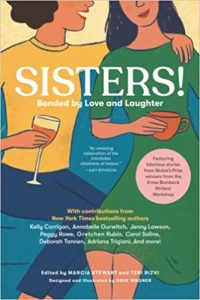An Interview with Teri Rizvi
 When I first met Teri Rizvi in person several years ago, I will admit to feeling a bit intimidated. As a self-taught author, sitting across from a trained journalist and experienced writer wracked my nerves. But the conversation flowed smoothly, and I soon realized that the Teri sitting in front of me was as gregarious and generous as the Teri I knew from her writing. Teri’s work has appeared in Christian Science Monitor, Dayton Daily News, The Guardian, University of Dayton Magazine, and USA Today, among others. What she’s best known for around the Dayton area, though, is as the founder and director of the biennial Erma Bombeck Writers’ Workshop at the University of Dayton, where she also serves as executive director of strategic communications. Teri recently published her first collection of essays and stories, One Heart with Courage, the proceeds of which help support the Erma Bombeck Writers’ Workshop endowment, and in true Teri style, she didn’t stop there: less than two weeks after the release of her essays and stories, the Bombeck Workshop published Sisters! Bonded by Love and Laughter, a collection edited by Teri herself. With so much on her plate, I’m especially grateful for Teri’s support and the time she took to answer my questions.
When I first met Teri Rizvi in person several years ago, I will admit to feeling a bit intimidated. As a self-taught author, sitting across from a trained journalist and experienced writer wracked my nerves. But the conversation flowed smoothly, and I soon realized that the Teri sitting in front of me was as gregarious and generous as the Teri I knew from her writing. Teri’s work has appeared in Christian Science Monitor, Dayton Daily News, The Guardian, University of Dayton Magazine, and USA Today, among others. What she’s best known for around the Dayton area, though, is as the founder and director of the biennial Erma Bombeck Writers’ Workshop at the University of Dayton, where she also serves as executive director of strategic communications. Teri recently published her first collection of essays and stories, One Heart with Courage, the proceeds of which help support the Erma Bombeck Writers’ Workshop endowment, and in true Teri style, she didn’t stop there: less than two weeks after the release of her essays and stories, the Bombeck Workshop published Sisters! Bonded by Love and Laughter, a collection edited by Teri herself. With so much on her plate, I’m especially grateful for Teri’s support and the time she took to answer my questions.
Christina: You’ve been a writer for a long time, often highlighting the work of others. The prelude to One Heart with Courage reveals what prompted you to put together a book showcasing your own work—the thought, “If not now, when?” How did it feel to focus on your own work? Did you ever doubt yourself or the project?
Teri: It felt right—and about time. When I stepped away eight years ago from my full-time job heading the communications and marketing team at the University of Dayton, it was under the illusion that I would have more time to do personal writing. Between running the Erma Bombeck Writers’ Workshop and writing for UD’s president, I had some extra time . . . to procrastinate. When I finally carved out time for myself, it was freeing. But, yes, I doubted myself. What writer doesn’t? You have to move past that, let go of perfection, and write your truth.
Christina: I love how you include the date of the writing at the end of each selection. How far back do the pieces go? How hard was it to choose from all your writings? What was the selection process like?
Teri: The essays go back to the beginning of modern civilization—1979. In that essay, which appeared in The Post at Ohio University, I wrote about an 81-year-old writer I met at Sinclair Community College’s Writers’ Workshop who showed me what striving to feel fulfilled as a writer really means. My editor and friend, Julie Fanselow, looked at my body of work with a fresh, objective eye. The book’s pieces seemed to naturally shake out by theme—from motherhood and friendship to a writer’s journey and faith. Together, we threw out pieces that seemed dated or read more like an op-ed than a personal essay. She also encouraged me to write some new pieces, which helped tie the book together in a strong, thematic way. I trusted Julie’s judgment. Every writer needs an editor she can trust.
Christina: Do you see any similarities between the earliest pieces and the latest? Differences? Can you see how your writing has changed?
Teri: I developed my writer’s voice early, and the tone carries through over the decades. That realization surprised me the most when I read through the manuscript. Perhaps I’m a more courageous writer today. I’m more willing to share my view of the world, rather than one seen solely through a journalist’s eyes.
Christina: You stated in an interview with Literary Mama that the book is a gift to your sons. Though they are grown men now, what do you hope they still learn from you? What do you hope to learn from them?
Teri: I hope they learn that it’s never too late to pursue your dreams. I hope they’re always courageous and willing to stand up for what’s right and just. We live in a divided world where too many people preach hate, but I want them to know it’s always the right path to take the high road. From them, I hope to learn the art of spontaneity and the joy of looking at life through fresh eyes. They both cook, so I hope to add a few of their recipes to my culinary attempts.
Christina: In 2000, you conceived the idea for the successful Erma Bombeck Writers’ Workshop. Can you tell us a little bit about that? What prompted the idea? Did you need to clear any obstacles in bringing the workshop to life?
Teri: Erma Bombeck’s family wanted to donate her papers to the University of Dayton, where she first found the encouragement to write from her English professor. At the same time, UD’s Alumni Association was seeking “big ideas” that could inspire pride in alumni and bring national visibility to the university. During that time, I worked with a volunteer public relations committee of alumni in writing, marketing, and publishing fields. Together, we came upon this idea to wrap a writers’ workshop around the announcement of Erma’s papers. Bill Bombeck, Erma’s widower, helped us bring such big names as syndicated humor columnist Art Buchwald, “Family Circus” cartoonist Bil Keane, and ERA advocate Liz Carpenter to the event. We literally laughed for three days. It was so much fun that we thought, Why don’t we do it again? The writers in my office helped pull the initial event off, and this was not our day job, so we opted to hold the next one two years later when we brought in Phil Donahue, Erma’s neighbor in Centerville, Ohio. We opened his talk up to the public, and thousands of community members joined writers in UD’s Fieldhouse. It was magical—and that’s been the spirit ever since. We had financial obstacles at the beginning, but we’ve always been fortunate to have the backing of the University of Dayton’s Alumni Association, which funds free scholarships for UD students to attend, and UD’s College of Arts and Sciences, a leading sponsor. Since 2000, we’ve been slowly building the endowment that has boosted our operating budget and allowed us to keep the event reasonably priced.
Christina: All proceeds from the sales of One Heart with Courage will go “to the Erma Bombeck Writers’ Workshop endowment, which helps keep the workshop affordable for writers.” That’s a generous show of literary citizenship for sure. How can the everyday writer, those who might not be involved so publicly, be good literary citizens?
Teri: Support other writers. Attend their book-signing events and workshops. Write reviews on Goodreads, publisher’s sites, Amazon, and other booksellers. Buy books for family members, friends and, particularly, young people. The love of reading starts early and blossoms as we get older.
Christina: You’re a mother, writer, executive director, workshop founder, volunteer, wife, and more. With all the hats you wear, how do you find balance? Is there anything you’d like to do that you haven’t tackled yet?
Teri: In all honesty, it’s a struggle for me to find balance. I tend to go at life full tilt and take on more projects and commitments than there are hours in the day. I’m not complaining—it’s a rich, full life. I would, however, like to tackle relaxation (laughing).
Teri, One Heart with Courage, and the Bombeck Workshop can be found in multiple places!
Website: https://udayton.edu/artssciences/initiatives/erma/books/one-heart-with-courage.php
Facebook: @ermabombeck
Instagram: @ermabombeckwritersworkshop
Twitter: @ebww
Thanks to Teri for agreeing to this interview! If you know of an author who’d like to be featured in an interview (or you are an author who would like to be featured), feel free to leave a comment or email me via my contact page.


